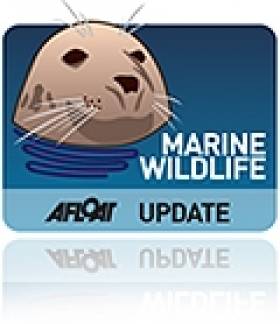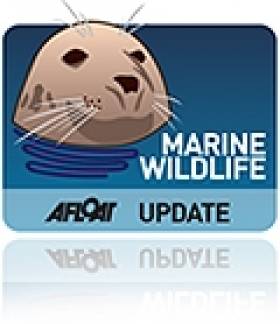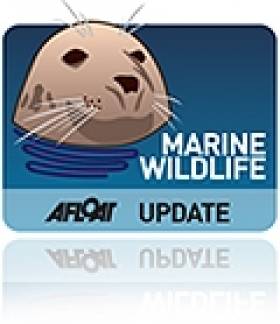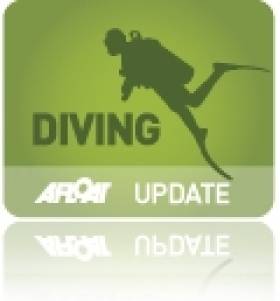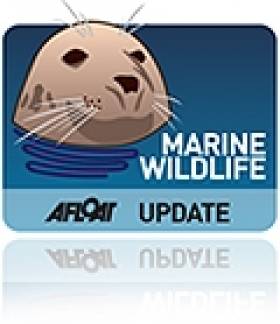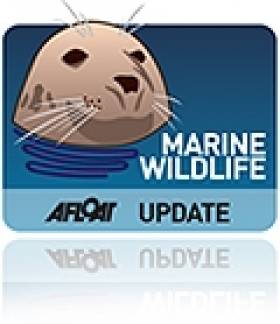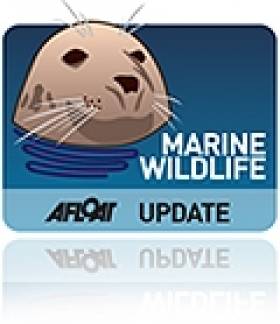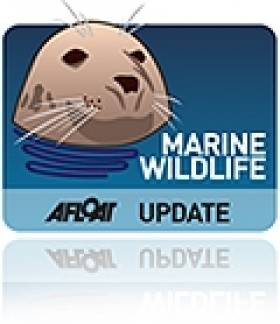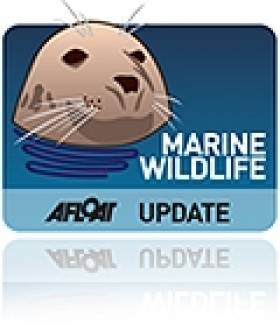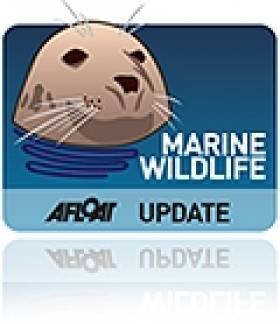Displaying items by tag: marine wildlife
Killer Whale Pod Nearing Its End Fear Experts
#MarineWildlife - A well-known killer whale pod often seen off the coasts of Scotland and Ireland is on the 'brink of extinction', as HeraldScotland reports.
Marine wildlife experts who have been monitoring the group for two decades say that no live calves have been recorded since their research began, and that the females of the group can no longer reproduce.
The orca pod, of which nine adults remain, is said to be genetically distinct from other killer whales in the North Atlantic, and bares closer relation to their cousins in Antarctic waters.
A spokesperson for the Hebridean Whale and Dolphin Trust described as "critical" the conservation status of the group.
"As sad as this is, the loss of this group has severe consequences, resulting in the loss of an evolutionary significant group of individuals," she added.
Researchers Film Dolphin 'Superpod' In Irish Sea
#MarineWildlife - BBC News has some incredible footage of a 'superpod' comprising hundreds of dolphins in the Irish Sea captured this week.
The video was shot by surprised researchers with the Wales-based Sea Trust on one of the groups routine survey expeditions between Fishguard and Rosslare on board the Stena Europe ferry.
Cliff Benson of the marine wildlife charity described the sea as "boiling" with dolphins just 10 miles off the Irish coast yesterday morning.
"They were just coming and coming. It was the last thing on earth I was expecting in the winter," he said. "We had at least 250 and that's a conservative estimate. I'm guessing there was as many as 500."
The incredible sight comes just a month after the researchers recorded what they called a "dolphin-fest" along the same route west of Tusker Rock, numbering more than a 100 dolphins and 26 porpoises.
BBC News has more on the story HERE - and more footage is available HERE via RTÉ News.
Live Giant Squid Filmed For First Time
#MarineWildlife - The video above is a world first for marine biology - the first known footage of a living giant squid in the ocean.
The remains of the elusive beast have been captured before, but news has now come out that a team of marine scientists finally recorded video of a living specimen deep below the surface off Japan's Ogasawara islands.
As RTÉ News reports, last July the team - working on a documentary for Discovery and Japanese TV network NHK - used a small submersible equipped with near-infrared lights invisible to both squid and human eyes.
After 100 attempts, they finally attracted the attention of a three-metre long cephalopod - small by giant squid standards, but the largest ever seen alive.
"It was stunning." said zoologist and team leader Tsunemi Kubodera. "I couldn't have dreamt that it would be so beautiful. It was such a wonderful creature."
The documentary Monster Squid: The Giant Is Real will be broadcast on the Discovery Channel in the US on 27 January, and hopefully will appear on Discovery UK & Ireland soon after.
Dive Ireland Expo Returns To Athlone For 2013
#Diving - The Dive Ireland expo heads to Athlone in 2013 with a full weekend of speakers, exhibits and workshops for divers and snorkelers of all levels.
This year's hosts at the Athlone Sub Aqua Club have announced details of the 22nd-annual dive show from 2-3 March 2013 at the Hodson Bay Hotel, which also doubles as the AGM for the Irish Underwater Council (CFT).
Speakers lined up for this year include renowned wreck diver Barry McGill, cave divers Jim Warney and Jason Masterson, limit-pushing free diver Feargus Callaghy and snorkelling advocate Victor Kutischev, as well as representatives from marine wildlife conservation group Sea Shepherd.
Just like last year, Dive Ireland 2013 will also feature a wide array of exhibitors to cater for all types of diver interests - and entry for each day costs just €5.
The Athlone Sub Aqua Club has more details on the Dive Ireland 2013 programme HERE.
Four Decapitated Seals In Tramore Add To Disturbing Total
#MarineWildlife - The Irish Seal Sanctuary is calling for immediate action by the National Parks and Wildlife Service (NPWS) after the discovery of four more seal carcasses in Tramore on Friday 21 December.
The four decapitated marine mammals reported by the Irish Examiner add to the eight found dead in Wexford and Waterford over recent days, bringing to 12 the total for the week.
Irish Seal Sanctuary spokesperson Johnny Woodlock told the Examiner: "It's an evolving situation down there. Only last night, I heard there were a few dead porpoises washed in. They are also a protected species.
Woodlock said yesterday (22 December) that he was still awaiting photographs in order to confirm the number of dead seals.
The disturbing turn of events echoes the reported "swing of activity" in seal fatalities around Ireland earlier in the year - the most horrific of these being the shocking scene of two baby seal heads nailed to a sign outside the Dingle Wildlife and Seal Sanctuary in June.
Renewed Concerns For Seals After Carcasses Found In South-East
#MarineWildlife - The Irish Seal Sanctuary has raised concerns after eight seals were found dead in Wexford and Waterford in recent days, as RTÉ News reports.
A shocking total of six carcasses were discovered near Fethard-on-Sea alone, while one apiece were found near Dunmore East and in Tramore - the latter reportedly decapitated.
The news comes just a few months after Johnny Woodlock of the Dingle Wildlife and Seal Sanctuary warned of a "swing of activity" in seal fatalities around Ireland earlier this year.
The most horrific of these incidents was the grisly scene of two baby seal heads nailed to a sign outside the Dingle wildlife sanctuary, accompanied by graffiti daubed in red paint reading 'RIP Cull' - presumed to be a reference to local fishermen's urging for a reduction of seal numbers in the area.
More recently, reports from Castlerock in Co Derry suggested that a dead seal found on the beach suffered a gunshot wound to the head.
All seals in Ireland are protected under national and EU law.
The Irish Seal Sanctuary is currently urging the National Parks and Wildlife Service to launch an investigation into these latest incidents, and is appealing to the public for information on these or other seal deaths.
RYA 'Encouraged' By Britain's Moves On Marine Conservation Zones
#RYA - The Royal Yachting Association (RYA) has said it is "encouraged" by the British government's approach to designating Marine Conservations Zones (MCZs) around the coastlines of England and Wales - the details of which have disappointed environmental groups.
RYA planning and environment advisor Caroline Price commented: “The phased approach that government is proposing appears on the face of it to be very sensible.
“The RYA has been resolute in insisting that an MCZ should be no larger than required to protect the habitats and wildlife features which it is intended to protect and that the scientific basis for designating a particular feature for protection should be sound.
“We are pleased therefore to see that ministers have recognised that they need to have a strong evidence base when looking to designate sites, from both an ecological and socio-economic perspective.
“We are particularly encouraged that the approach to highly protected sites is being reviewed as the proposals for Reference Areas are of great concern to us.”
Of the 31 sites proposed in the consultation for designation by the end of 2013, the RYA has objections to only one of the sites - the Aln Estuary, which contains "a small charted anchorage in the one location in which a vessel can stay afloat at all states of the tide in the estuary".
The response from the RYA comes just days after environmental groups in the UK expressed their dismay over the government's decision to designate just a quarter of the recommended 127 sites.
As the Guardian reports, Westminster was accused of a "lack of ambition" by the Marine Conservation Society (MCS) over the announcement last Thursday 13 December, which it says ignores the government's own advisers who recommend a 'coherent network' that includes immediate designation for 59 sites regarded as 'highly threatened'.
The RYA says it is "broadly supportive of government plans to establish a coherent network of Marine Protected Areas and Marine Conservation Zones.
"However, it has fought throughout the process to date, and will continue to do so, to protect the public right of navigation and to ensure, as far as is possible, that recreational boating interests are not adversely affected by the designation of such MCZs."
It also emphasises that the "omission of the detail of management measures from this [public] consultation means that we still don’t really know what designation will actually mean" to affected local communities.
Donegal Shark Prank Not So Funny After All
#MarineWildlife - Recent hijinks by a group of Irish surfers in 'shark-infested waters' off Donegal have been making the rounds online - but they're not all what they seem.
IrishCentral reports on the video, apparently posted by surfers from Rossnowlagh, which shows the group on a RIB pushing one of their own overboard into the path of an oncoming shark.
Yet despite their reactions, they were never in any danger, as the shark was one of Ireland's harmless giants - a basking shark - who clearly attempts to dodge the dinghy as it approaches.
Indeed, the shark may even have been in more danger from the surfers than they were from it, as the marine species is designated as protected under EU law, which makes it illegal to disturb or harass them.
As reported on Afloat.ie earlier this year, the UK's Shark Trust has published a code of conduct for anyone encountering basking sharks in British or Irish waters - and pushing someone overboard on top of one is definitely absent from the list.
Dismay Over Britain's 'Lack of Ambition' Over Marine Conservation Zones
#MarineWildlife - Fears among conservation groups that the UK would enact just a quarter of the proposed Marine Conservation Zones (MCZs) in British waters have been realised with the news that just 31 out of a potential 127 sites will be designated as protected by the end of 2013.
The original proposals, as reported last year on Afloat.ie, cover the waters around the English and Welsh coastlines - of which only 1% is currently protected - recommending a variety of zones that offer different levels of protection for marine wildlife and plantlife, allowing flexibility for fishing and other activities.
A government decision on the conservation areas was already postponed in November last year after pressure from coastlines users.
But as the Guardian reports, Westminster has now been accused of a "lack of ambition" by the Marine Conservation Society (MCS) over the announcement on Thursday 13 December, which the charity says flies in the face of the government's own advisers who have recommended a 'coherent network' of sites around Britain, including the immediate designation for 59 sites regarded as 'highly threatened'.
"We cannot delay protection," said Jean-Luc Solandt of MCS. "We wouldn't stand by and let wildflower meadows and ancient forests be dug up and cleared, and yet heavy fishing gear is dragged across all kinds of habitats, destroying large swaths of the seabed with very little control."
The World Wide Find for Nature (WWF) added to the chorus of disapproval, saying the decision by the Department of Environment, Food and Rural Affairs (Defra) "falls woefully short of what is needed to protect the marine environment".
Ali Champion of WWF UK said: “It’s disappointing and shows a complete lack of commitment to the protection of our seas in a coherent way."
Of the four zones recommended for the Irish Sea area, only one - at Fylde Offshore, off Lancashire - has been chosen by Defra for protection. But as the Blackpool Gazette reports, local campaigners say they will vow to continue the fight to 'save our seas'.
Black Swan Bedazzles Birdwatchers in Belfast
#BlackSwan - A rare black swan has been spotted in the wild making its home in Northern Ireland, as BBC News reports.
The species, which is native to Australia, has never before been seen in the wild on this island. But a female black swan has recently been seen at the Waterworks public park in north Belfast, astounding local bird enthusiasts.
The bird is presumed to be an escapee from a private waterfowl collection, but as local 'twitcher' Aidan Crean enthused, she's a more than welcome addition to Belfast's urban wildlife.
"We have coots, moor hen, mallards, about 100 black headed gulls that have come in from Belfast Lough, a couple of mute swans and in the middle of it all an amazing black swan, pure black with a red bill," he said.
BBC News has much more on the story HERE.



























